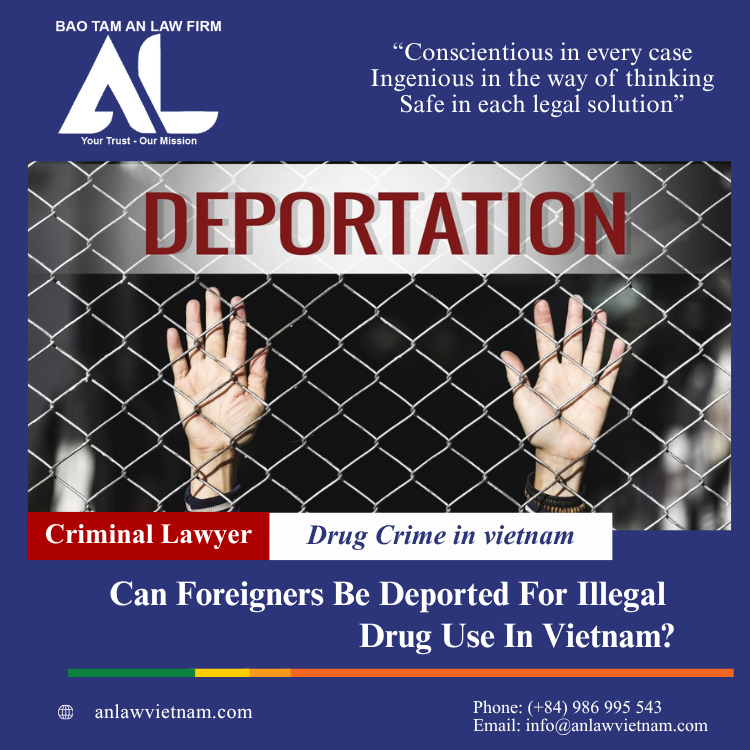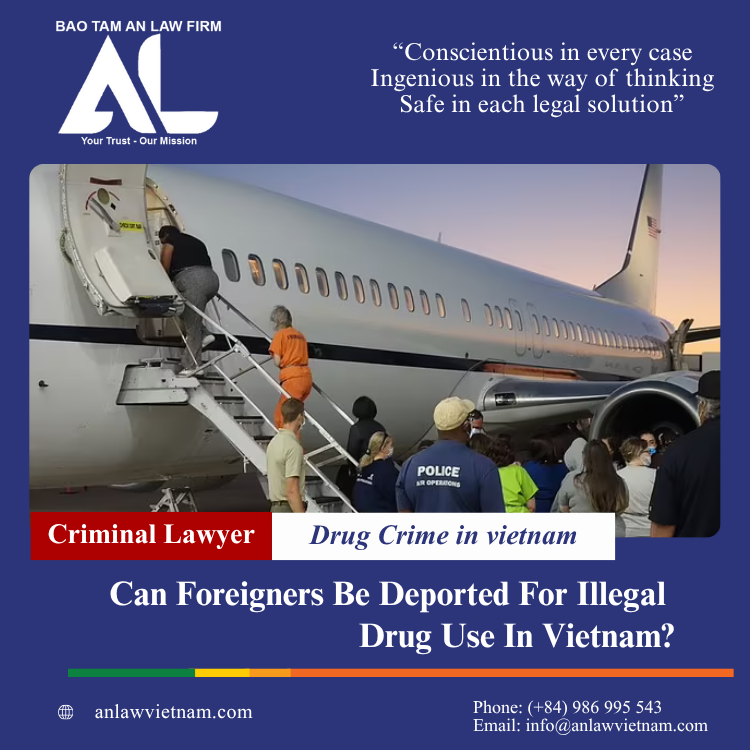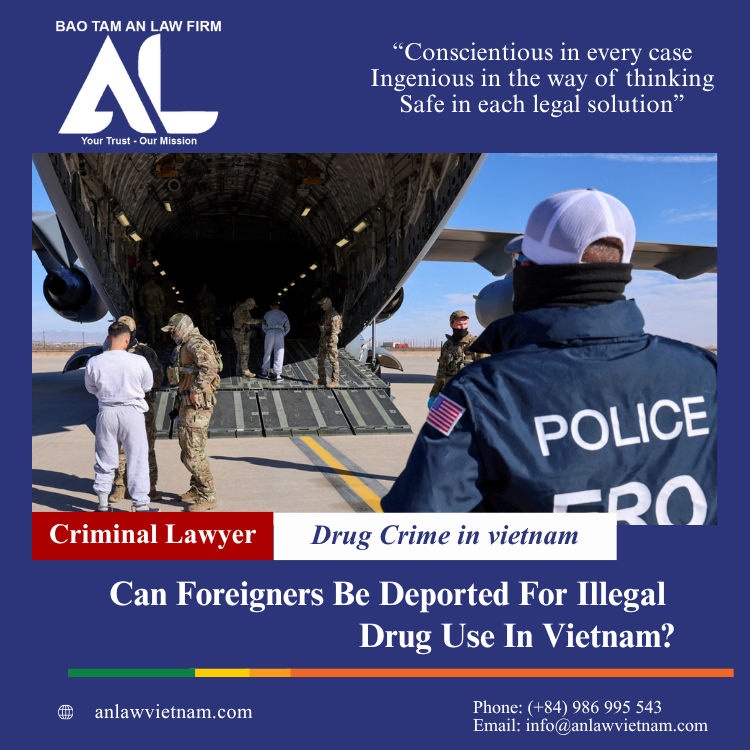Can Foreigners Be Deported For Illegal Drug Use In Vietnam?
In the current context where Vietnam is intensifying its efforts to combat drug-related offenses, the handling of foreign nationals engaged in the illegal use of narcotic substances has become a matter of particular legal and administrative concern.
Under the provisions of Criminal Law in Vietnam, foreign individuals found violating drug regulations may be subject to administrative sanctions, deportation from the territory of Vietnam, and a temporary prohibition from re-entry.
This article by An Law Vietnam – with a team of expert lawyers specializing in Criminal Law in Vietnam and Criminal Defense Drug Crime – aims to clarify the following key issues:
- Circumstances under which a foreign national may be deported for illegal drug use in Vietnam?
- Required documentation and deportation procedures?
- Mandatory contents of a deportation decision?
- Competent authorities responsible for enforcement?
- Time for implementing deportation?

- A warning or a monetary fine ranging from VND 1,000,000 to VND 2,000,000; and
- Deportation from the territory of Vietnam as an additional administrative sanction.
Specifically, Point d, Clause 8, Article 23 stipulates:
“Foreign nationals committing administrative violations as prescribed in Clauses 1 through 7 of this Article shall be subject to deportation.”
Accordingly, a foreigner who uses, stores, transports, or appropriates narcotic substances or precursor chemicals for drug production without sufficient criminal elements to constitute a criminal offense may still be deported from Vietnam.
This deportation measure serves both a deterrent purpose and the goal of maintaining public order, social safety, and national security.
Under Article 12 of Decree No. 142/2021/NĐ-CP, when a foreign national commits a Drug Crime in Vietnam (specifically, the illegal use of narcotics), a full deportation dossier must be prepared to ensure legality, transparency, and procedural integrity.
The dossier shall include:
- The Decision on the application of deportation as an administrative sanction;
- The administrative violation report;
- The deportation proposal file as prescribed under Article 8 of Decree No. 142/2021/NĐ-CP;
- A copy of the violator’s passport or substitute identification document;
- Proof of fulfillment of other obligations (if any);
- Any other relevant documents or evidence.
The Provincial Police Department or the Department of Immigration Management – Ministry of Public Security shall be responsible for preparing and finalizing the dossier.
This dossier serves as a key legal basis for competent authorities to issue a deportation decision while safeguarding the legitimate rights and interests of the individual concerned.
Mandatory contents of a deportation decision
Pursuant to Article 9 of Decree No. 142/2021/NĐ-CP, the deportation decision must be issued within two (02) working days from the date on which the Immigration Management Authority receives a complete proposal.
The decision shall contain the following essential elements:
- Place, date, month, and year of issuance;
- Legal grounds for the decision;
- Administrative violation report, investigation findings, and written explanation from the individual concerned;
- Full identity information of the deportee (name, date of birth, nationality, occupation, passport number, or equivalent document);
- Description of the violation, aggravating or mitigating circumstances (if any);
- Applicable legal provisions;
- Primary and supplementary penalties, and any remedial measures (if applicable);
- Rights to appeal and initiate legal proceedings;
- Effective date and duration of execution;
- Destination of deportation and enforcing authority.
The decision must be drafted in both Vietnamese and English and sent to the Ministry of Foreign Affairs and the diplomatic or consular mission of the deportee’s home country prior to execution.
If the conditions for deportation are deemed insufficient, the competent authority shall promptly notify the investigating agency for alternative handling.

The deportation procedure for foreign nationals committing Drug Crime in Vietnam (such as illegal drug use or possession) shall follow the administrative procedures stipulated under Vietnamese law, including the following steps:
- Step 1. Detection and documentation of violation
When law enforcement authorities (e.g., police, border guards, or relevant agencies) detect a foreigner using narcotic substances illegally, they shall prepare an administrative violation report, seize relevant evidence (if any), and forward the case to the competent authority. - Step 2. Preparation of deportation dossier
The Immigration Management Authority collects necessary documents, evidence, and prepares a deportation proposal dossier in accordance with Articles 8 and 12 of Decree No. 142/2021/NĐ-CP. - Step 3. Issuance of deportation decision
Within two (02) working days from receipt of the complete dossier, the Director of the Provincial Police Department or the Director General of the Immigration Department shall review and issue a deportation decision. - Step 4. Notification and execution
The deportation decision shall be delivered to the violator, the Ministry of Foreign Affairs, and the relevant foreign diplomatic mission.
The individual subject to deportation may be temporarily detained at a designated facility until exit procedures are completed. - Step 5. Enforcement of deportation
The competent police authority coordinates with diplomatic representatives and relevant entities to ensure that the deportee leaves the territory of Vietnam lawfully, safely, and in full compliance with Vietnamese regulations.
Competent authorities in charge of deportation
According to current Vietnamese law, the following bodies are empowered to organize and implement deportation measures:
- The Department of Immigration Management – Ministry of Public Security;
- The Provincial Police Departments where the violation occurred.
Their key responsibilities include:
- Preparing dossiers and issuing deportation decisions;
- Ensuring enforcement in accordance with statutory deadlines;
- Cooperating with diplomatic missions to facilitate lawful and safe repatriation of the deportee.
Timeframe for Deportation of Foreign Nationals for the Illegal Use of Narcotic Substances in Vietnam
Time Limit for Enforcement of Deportation Decisions
Pursuant to Article 10 of Decree No. 142/2021/NĐ-CP, a foreign national subject to a deportation decision must leave the territory of Vietnam within fifteen (15) days from the date on which the decision takes effect, unless an extension is granted by the competent authority for legitimate reasons.
Accordingly, the maximum period for the execution of a deportation order is 15 days from the date of issuance.
During the enforcement period, the deportee:
- May be temporarily detained at a designated accommodation facility under the management of the Ministry of Public Security;
- Must comply with the instructions concerning exit procedures; and
- Shall not leave the place of residence or depart from Vietnam without official authorization.
Period of Re-Entry Ban Following Deportation
Under the Law on Entry, Exit, Transit, and Residence of Foreigners in Vietnam (Law No. 47/2014/QH13, as amended in 2019), any person deported from Vietnam shall be prohibited from re-entering the country for a period ranging from one (01) year to five (05) years, depending on the nature and severity of the violation.
Specifically:
- For administrative violations (e.g., illegal drug use), the ban on re-entry typically ranges from 01 to 03 years;
- For serious or repeated violations, the re-entry ban may extend up to 05 years.
The duration of the re-entry ban must be expressly stated in the deportation decision and notified to the diplomatic or consular mission of the deportee’s home country.
Suspension or Postponement of Deportation
In certain humanitarian or objective circumstances, a foreign national subject to deportation may request a suspension or postponement of the deportation order, such as in cases where the person:
- Is undergoing medical treatment for a serious illness;
- Is caring for a minor child; or
- Is awaiting the recovery of travel documents or flight arrangements.
A petition for suspension or postponement must be submitted to the Department of Immigration Management – Ministry of Public Security, accompanied by supporting documentation substantiating the grounds for the request.

An Law Vietnam – Expert Criminal Defense in Drug Crime in Vietnam
With extensive experience in Criminal Law in Vietnam, An Law Vietnam criminal lawyers have provided legal defense and consultation in numerous complex Drug Crime in Vietnam cases, particularly involving foreign nationals subject to criminal prosecution or administrative penalties.
Our areas of expertise include:
- Criminal Defense Drug Crime – defense in narcotics-related criminal cases;
- Legal consultation and protection of rights for individuals subject to administrative penalties or deportation;
- Assistance in legal procedures to request suspension or mitigation of deportation decisions (where legal grounds permit).
The early involvement of defense counsel during investigation, sanction, or deportation proceedings is crucial to protecting the lawful rights and interests of foreign nationals in Vietnam.
“As well as our team of Lawyers have successfully represented many foreign nationals in drug deportation and administrative cases before the authorities”.
At An Law Vietnam, we are more than a law firm – we are your trusted legal partner in all matters related to Criminal Law in Vietnam and Drug Crime in Vietnam.
Contact An Law Vietnam
📞 Phone: (+84) 986 995 543
📧 Email: info@anlawvietnam.com
📍 Head Office: Diamond Plaza, 34 Le Duan Street, Sai Gon Ward, Ho Chi Minh City
🏢 Vung Tau Branch: Vo Thi Sau Street, Vung Tau Ward, Ho Chi Minh City
Note: This article is for reference purposes only. As Vietnam’s legal policies may change over time, the information provided above may no longer be applicable in certain specific cases. For any questions or comments, please contact An Law Vietnam for timely assistance.
Related Articles:
Compilation of the Latest Guiding Instruments on the Criminal Code – 2025 Update
Drug Crime In Vietnam – Criminal Code (Amended And Supplemented In 2025)
Drug Crime in Vietnam – Typical Examples
Penalties for Foreigners Using Drugs in Vietnam – Understanding the Legal Risks
Can Foreigners Be Deported For Illegal Drug Use In Vietnam?
Drug Crime in Vietnam: Illegal Possession of Narcotic Substances – Latest Penalties under Vietnamese Criminal Law (2025 Update)
